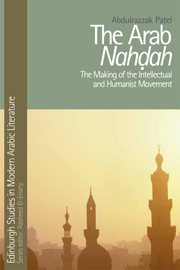Book contents
- Frontmatter
- Contents
- Series Editor's Foreword
- Acknowledgements
- Preface
- Introduction: Perspectives, Paradigms and Parameters
- 1 Contemporary Interpretations of the Nahḍah: Tradition, Modernity and the Arab Intellectual
- 2 The Reintegration of Pre-modern Christians into the Mainstream of Arabic Literature and the Creation of an Inter-religious Cultural Space
- 3 Guardians of the Pre-modern Arab-Islamic Humanist Tradition: Legends without a Legacy, a Tradition without Heirs
- 4 Language Reform and Controversy: The al-Shartūnīs Respond in Defence of the Pre-modern Humanist Tradition
- 5 Arabism, Patriotism and Ottomanism as Means to Reform
- 6 Arab Intellectuals and the West: Borrowing for the Sake of Progress
- 7 Education, Reform and Enlightened Azharīs
- 8 Enacting Reform: Local Agents, Statesmen, Missionaries and the Evolution of a Cultural Infrastructure
- Conclusion
- Bibliography
- Index
7 - Education, Reform and Enlightened Azharīs
Published online by Cambridge University Press: 05 October 2013
- Frontmatter
- Contents
- Series Editor's Foreword
- Acknowledgements
- Preface
- Introduction: Perspectives, Paradigms and Parameters
- 1 Contemporary Interpretations of the Nahḍah: Tradition, Modernity and the Arab Intellectual
- 2 The Reintegration of Pre-modern Christians into the Mainstream of Arabic Literature and the Creation of an Inter-religious Cultural Space
- 3 Guardians of the Pre-modern Arab-Islamic Humanist Tradition: Legends without a Legacy, a Tradition without Heirs
- 4 Language Reform and Controversy: The al-Shartūnīs Respond in Defence of the Pre-modern Humanist Tradition
- 5 Arabism, Patriotism and Ottomanism as Means to Reform
- 6 Arab Intellectuals and the West: Borrowing for the Sake of Progress
- 7 Education, Reform and Enlightened Azharīs
- 8 Enacting Reform: Local Agents, Statesmen, Missionaries and the Evolution of a Cultural Infrastructure
- Conclusion
- Bibliography
- Index
Summary
No matter how nahḍah intellectuals differed, they all agreed that ignorance was one of the main reasons for the stagnation (jumūd) and decline (inḥiṭāṭ) of their people, and that knowledge and education would pave the way for progress and civilisation. Moreover, they all insisted that the cultivation of humanistic learning (i.e., grammar, rhetoric, poetry, history and moral philosophy) was the basic formula for cultural and moral renewal, and adopted a methodology towards educational reform that involved the importation of modern Western learning, the simultaneous revival of classical Arab-Islamic traditions, and the dissemination of the knowledge thus acquired through the curricula and user-friendly textbooks. In this manner, they wanted to cultivate the zeal for modern knowledge while preserving Arab-Islamic culture. This chapter illustrates the development and diffusion of these ideas among Muslim intellectuals during the course of the nineteenth century by focusing on the educational activities and works of a number of Azharī scholars. At the same time, the chapter hopes to highlight the important contribution of these scholars to educational reform in the nahḍah.
Al-Ṭahṭāwī and the School of Languages
In Egypt, reformers had recognised the importance of education from the very start. During his sojourn in Paris in 1826, al-Ṭahṭāwī had already concluded that European political, scientific and economic progress could not have materialised without prior progress in the field of education. On returning to Cairo in 1831, he called for reforms in Islamic law, by reopening the door of rational interpretation (ijtihād), and also for reforms in the education of the ‘ulamā’ through the introduction of modern learning into their curriculum.
- Type
- Chapter
- Information
- The Arab NahdahThe Making of the Intellectual and Humanist Movement, pp. 181 - 200Publisher: Edinburgh University PressPrint publication year: 2013



